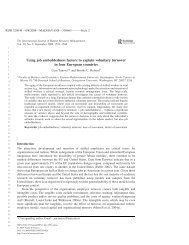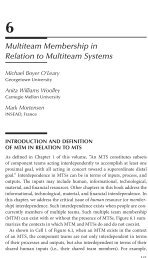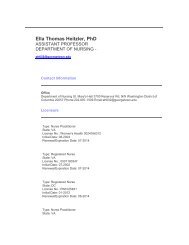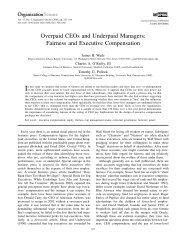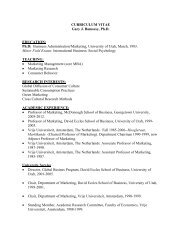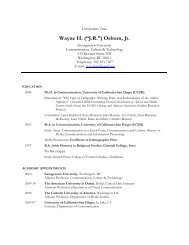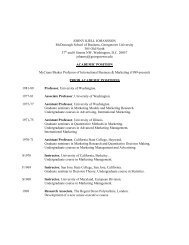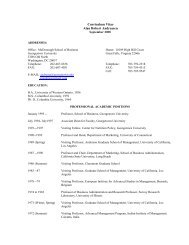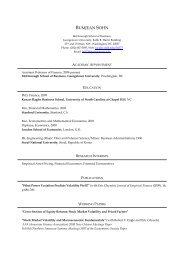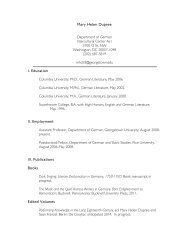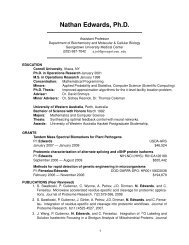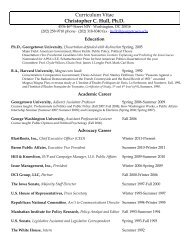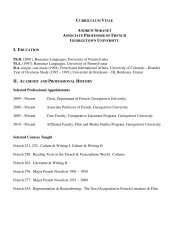Mediation and Saudi Foreign Policy - Georgetown University
Mediation and Saudi Foreign Policy - Georgetown University
Mediation and Saudi Foreign Policy - Georgetown University
You also want an ePaper? Increase the reach of your titles
YUMPU automatically turns print PDFs into web optimized ePapers that Google loves.
By Mehran Kamrava<strong>Mediation</strong> <strong>and</strong> <strong>Saudi</strong> <strong>Foreign</strong> <strong>Policy</strong>Mehran Kamrava is Professor <strong>and</strong> Director of the Center for International <strong>and</strong> RegionalStudies, at <strong>Georgetown</strong> <strong>University</strong>’s School of <strong>Foreign</strong> Service in Qatar.Abstract: <strong>Saudi</strong> Arabia has positioned itself among the primary mediators in some of theMiddle East’s most intractable conflicts, having played mediatory central roles in Lebanon,Palestine, <strong>and</strong> in Arab-Israeli conflict. Compared with the mediation efforts of another frequentregional mediator, namely Qatar, <strong>Saudi</strong> mediation initiatives tend to be more institutionallygrounded <strong>and</strong> are less personal in nature, <strong>and</strong> often involve less fanfare <strong>and</strong> are more discreet. Atthe same time, the Kingdom is not always readily identified with its satellite media network of AlArabiya in the same way that Qatari foreign policy is perceived to be closely aligned with AlJazeera coverage. Although such efforts have seldom resulted in successful resolution of conflictsamong the disputants involved, the Kingdom has used mediation to successfully further its twinobjectives of ensuring <strong>and</strong> furthering state <strong>and</strong> regime security, while also playing a centralcoordinating role in regional affairs. As such, <strong>Saudi</strong> Arabia is likely to continue to play a similarmediatory role in the foreseeable future.<strong>Saudi</strong> Arabia is one of the world’s most strategically-located countries, housingIslam’s two holiest cities <strong>and</strong> sitting on top of the world’s largest proven oildeposits. Accordingly, the Kingdom’s foreign policy <strong>and</strong> international relationshave been the subject of extensive study over the years. 1 <strong>Saudi</strong> Arabia’s strategicimportance has only grown in recent years given the chronic instability <strong>and</strong> tensionsAuthor’s Note: The research for this article was made possible by a grant from the QatarNational Research Fund’s National Priorities Research Program, NPRP08-003-5-001. Igratefully acknowledge the assistance of several officials at the Ministries of <strong>Foreign</strong> Affairsof the Kingdom of <strong>Saudi</strong> Arabia <strong>and</strong> the Palestinian National Authority for providinginvaluable information concerning <strong>Saudi</strong> mediation efforts, in general, <strong>and</strong> in relation to theArab-Israeli conflict, in particular, through confidential interviews.© 2013 Published for the <strong>Foreign</strong> <strong>Policy</strong> Research Institute by Elsevier Ltd.Winter 2013 | 1
KAMRAVAthat have characterized the Middle East’s domestic as well as international politics.However, a persistent <strong>and</strong> prominent feature of <strong>Saudi</strong> foreign policy, namely theKingdom’s frequent attempts at mediating some of the Middle East’s mostintractable conflicts has not garnered much attention. Over the past several decades,the <strong>Saudi</strong>s have taken on some of the most deeply entrenched conflicts in the Arabworld <strong>and</strong> the larger Middle East <strong>and</strong> proposed bilateral, regional, <strong>and</strong> eveninternational solutions of one kind or another. The success record of suchmediation efforts is far from stellar; in fact, the <strong>Saudi</strong>s have succeeded in very few ofthe mediation efforts in which they have embarked. Nevertheless, conflict mediationcontinues to be one of the most salient features of <strong>Saudi</strong> foreign policy.This article explores three related questions that are central to <strong>Saudi</strong> conflictresolution efforts. First, what role does mediation <strong>and</strong> conflict resolution play in theoverall formulation <strong>and</strong> conduct of <strong>Saudi</strong> foreign policy? In an effort to garnerprestige <strong>and</strong> greater international legitimacy, practically all states, at one level oranother, seek to mediate conflicts both small <strong>and</strong> large, especially in their ownimmediate region. 2 But the <strong>Saudi</strong>s have employed mediation both as a foreign policytool <strong>and</strong> as an objective with a frequency seldom matched by other regional or eveninternational actors. Why is this the case? The answer seems to be in <strong>Saudi</strong> Arabia’sself-ascribed role as a “regional coordinator,” by virtue of its position within theregion, its need to ensure regime security, <strong>and</strong> its desire to be a key player in shapingthe overall diplomatic profile of the Middle East region.Second, the article explores the modus oper<strong>and</strong>i of such mediation efforts. Howdo the <strong>Saudi</strong>s go about mediating regional conflicts, <strong>and</strong> what means do theyemploy in proposing or bringing about solutions to regional conflicts? Qatar hasalso feverishly embarked on a number of high-profile conflict resolution efforts inthe Middle East <strong>and</strong> parts of Africa. 3 How do <strong>Saudi</strong> mediation efforts compare with,those of Qatar?Finally, the article presents a balance sheet of <strong>Saudi</strong> mediation efforts,assessing the extent to which <strong>Saudi</strong> policymakers have met their actual objectivesthrough presenting mediation proposals <strong>and</strong> sponsoring platforms. The <strong>Saudi</strong>record in this regard is somewhat mixed. The article will demonstrate that insofar asconflict resolution is concerned, the <strong>Saudi</strong>s have not actually had great successes. Butthe purpose <strong>and</strong> process of mediation efforts are sometimes just as important as the1 One of the most comprehensive yet concise treatments of <strong>Saudi</strong> foreign policy can be found in F.Gregory Gause, III. “The <strong>Foreign</strong> <strong>Policy</strong> of <strong>Saudi</strong> Arabia,” Raymond Hinnebusch <strong>and</strong> AnoushiravanEhteshami, eds. The <strong>Foreign</strong> Policies of Middle East States (Boulder, CO: Lynne Rienner, 2002), pp. 193-211. Equally valuable is Gerd Nonneman, “Determinants <strong>and</strong> Patterns of <strong>Saudi</strong> <strong>Foreign</strong> <strong>Policy</strong>:‘Omnibalancing’ <strong>and</strong> ‘Relative Autonomy’ in Multiple Environments,” Paul Aarts <strong>and</strong> GerdNonneman, eds. <strong>Saudi</strong> Arabia in the Balance: Political Economy, Society, <strong>Foreign</strong> Affairs (New York: NewYork <strong>University</strong> Press, 2005), pp. 315-351. A comprehensive treatment of <strong>Saudi</strong> security policy may befound in Anthony H. Cordesman. <strong>Saudi</strong> Arabia: National Security in a Troubled Region (Washington, DC:Center for International <strong>and</strong> Strategic Studies, 2009).2 Jacob Bercovitch <strong>and</strong> Scott Sigmund Gartner. “Empirical Studies in International <strong>Mediation</strong>,”International Interactions. Vol. 32, (2006), pp. 319–328.3 Mehran Kamrava. “<strong>Mediation</strong> <strong>and</strong> Qatari <strong>Foreign</strong> <strong>Policy</strong>,” Middle East Journal, Fall 2011.2 | Orbis
<strong>Mediation</strong> <strong>and</strong> <strong>Saudi</strong> <strong>Foreign</strong> <strong>Policy</strong>outcome of such endeavors. In the case of <strong>Saudi</strong> Arabia, success in launching <strong>and</strong>taking part in mediation efforts cannot focus solely on the outcome of suchundertakings in getting the disputants to settle their conflicts peacefully. <strong>Saudi</strong>Arabia views mediation as an integral tool in its foreign policy goals of maintainingan active involvement in regional issues, enhancing <strong>and</strong> deepening its influenceamong the different parties involved in national <strong>and</strong> cross-border disputes, <strong>and</strong>using foreign policy objectives <strong>and</strong> initiatives as a means of ensuring <strong>and</strong>perpetuating domestic political legitimacy for the state. Viewed in these terms—notnecessarily as bringing about successful conflict resolution but instead furthering<strong>Saudi</strong> Arabia’s own, specifically-designed foreign policy objectives—the Kingdom’smediation efforts have been indeed successful in meeting their goals.In the Middle East, it should be noted, third party attempts at mediatingconflicts have a long history. 4 In fact, across the Middle East <strong>and</strong> especially in theArab world there has been a long tradition of formal mediation <strong>and</strong> conflictresolution efforts dating back to the creation of the Arab League in March 1945. Inmuch of the literature on the international relations of the Middle East, <strong>and</strong> morespecifically on the Persian Gulf sub-region, it is often assumed that the GCC hashad relative success in mediating cross-border conflicts since its inception in 1981—between Oman <strong>and</strong> Yemen, Bahrain <strong>and</strong> Qatar, <strong>and</strong> Qatar <strong>and</strong> <strong>Saudi</strong> Arabia. 5However, this assumption is not substantiated. In fact, most of the mediationefforts that have resolved these conflicts, while “under the informal clout of theGCC,” have been due to the efforts of either Qatar or <strong>Saudi</strong> Arabia. 6 In reality,neither the GCC nor even the Arab League has had much success in mediation<strong>and</strong>/or conflict resolution. 7 There are various reasons for this failure by both theArab League <strong>and</strong> the GCC to successfully <strong>and</strong> meaningfully mediate regionalconflicts. Some of these mediation failures stem from the institutional weaknessesinherent in both entities as international organizations capable of institutingmeaningful change or sponsoring mediation initiatives; the increasing ascendancewithin the two organizations of personalities over institutions <strong>and</strong> establishedprocedures; <strong>and</strong>, as a corollary, regional <strong>and</strong> national competition between theconstituent member states <strong>and</strong> their leaders. 84 For a survey of some recent regional mediation attempts in the Middle East see, Michael Bauer <strong>and</strong>Julia-Kristina Ismar. “Regional Problems—Regional Solutions? Taking stock of the recent mediationefforts in the Middle East,” Munich: Center for Applied <strong>Policy</strong> Research, Ludwig Maximilians<strong>University</strong> Munich, 2008.5 Marco Pinfari. Nothing but Failure? The Arab League <strong>and</strong> the Gulf Cooperation Council as Mediators in MiddleEastern Conflicts, Crisis States Working Papers Series No. 2, Destin Development Studies Institute,London School of Economics <strong>and</strong> Political Science, March 2009, p. 8.6 Ibid. p. 17.7 Ibid.8 See, Michael Barnett <strong>and</strong> Etel Solingen. “Designed to Fail or Failure to Design? The Origins <strong>and</strong>Legacy of the Arab League,” Amitav Acharya <strong>and</strong> Alastair Iain Johnston, eds. Crafting Cooperation:Winter 2013 | 3
KAMRAVAThe innate weakness of the GCC <strong>and</strong> the Arab League has facilitated thecreation of a regional environment that is conducive to <strong>Saudi</strong> Arabia initiatingmediation efforts. Capitalizing on such a vacuum, at least up until Qatar startedundertaking similar initiatives, as part of a broader menu of foreign policy tools,over the last several decades <strong>Saudi</strong> Arabia has sought to proactively <strong>and</strong> unilaterallymediate among regional disputants across the Arab world <strong>and</strong> the larger MiddleEast. A small sample of <strong>Saudi</strong> mediation efforts includes the following:September 1973: Arab summit in Cairo, King Faisal mediatesreconciliation among Egypt, Syria, <strong>and</strong> Jordan;November 1981: vague <strong>Saudi</strong> mediation efforts diffuse tensionsbetween Jordan <strong>and</strong> the Steadfastness <strong>and</strong> Confrontation Front(Libya, Syria, Algeria, South Yemen, <strong>and</strong> the PLO) that could haveled to the eruption of Jordanian-Syrian hostilities;1985-1986: <strong>Saudi</strong> mediation talks lead to the restoration ofdiplomatic ties between Jordan <strong>and</strong> Syria;1986: <strong>Saudi</strong> mediation leads to a truce regarding the Bahraini claimto Zubarah on northwestern coast of Qatar <strong>and</strong> to Hawar isl<strong>and</strong>ssouth of Zubarah;January 1989: the Reagan Administration rejects offer by <strong>Saudi</strong>Arabia to mediate between U.S. <strong>and</strong> Libya (before U.S. fighterplanes shoot down Libyan jets);October 1989: Taif Accord brings to an end the Lebanese civil war<strong>and</strong> lays the foundations for a post-conflict political order in thewar-torn country;1991: <strong>Saudi</strong>-led mediation efforts between Qatar <strong>and</strong> Bahraincontinue;2002: Prince Abdulla Peace Initiative aimed at resolving the Arab-Israeli conflict;November 2005: King Abdullah mediates an underst<strong>and</strong>ing betweenthe United States <strong>and</strong> Syria on the interrogation of top Syrianofficials about the assassination of Lebanese premier Rafiq Hariri;Regional International Institutions in Comparative Perspective (Cambridge: Cambridge <strong>University</strong> Press, 2007),pp. 180-220.4 | Orbis
<strong>Mediation</strong> <strong>and</strong> <strong>Saudi</strong> <strong>Foreign</strong> <strong>Policy</strong>October 2007: the <strong>Saudi</strong>s invite top leaders of Somalia for mediationtalks on the country;February 2007: Mecca Accord, aims at fostering reconciliationbetween Fatah <strong>and</strong> Hamas; <strong>and</strong>,2010: <strong>Saudi</strong> Arabia starts mediation between the Taliban <strong>and</strong> theAfghan government in February, but efforts halted by Novemberwhen Taliban refuse to sever links with al Qaeda.<strong>Saudi</strong> <strong>Foreign</strong> <strong>Policy</strong> Objectives<strong>Saudi</strong> Arabia claims the mantle of Islamic leadership. It has used Mecca “as a tool offoreign policy” since 2006. 9 But keenly sensitive to both international <strong>and</strong> domesticsources of legitimacy as keys to regime security, <strong>Saudi</strong> foreign policy has deemed tobe cautious in character. 10 This caution is reinforced by “an extraordinary culturalself-assurance <strong>and</strong> a heightened sense of insecurity based on being an insular peoplesurrounded by enemies.” 11 Such a “highly developed encirclement syndrome” hasresulted in the merger of <strong>Saudi</strong> foreign <strong>and</strong> security policies from the very beginningof the Kingdom. 12 Not surprisingly, regime <strong>and</strong> state survival has been the centralgoal of <strong>Saudi</strong> domestic <strong>and</strong> foreign policy. 13 Additionally, <strong>Saudi</strong> foreign policy hasbeen shaped by a strong conception by the Kingdom of its role as a regionalsuperpower <strong>and</strong> hegemon <strong>and</strong> a bulwark of both regional <strong>and</strong> global stability. The<strong>Saudi</strong>s have also historically ascribed to themselves, as a key element of their foreignpolicy “role conception,” a responsibility to look after the peace <strong>and</strong> well-being ofIslam <strong>and</strong> Muslims worldwide. 14At the same time, especially since the collapse of the monarchical state in Iranin 1979, <strong>Saudi</strong> foreign policy interests have been closely aligned with those of theUnited States on a wide range of significant issues, including containing “the Iranianthreat,” maintaining the regional status quo, ensuring moderate Sunni dominance in9 Mai Yamani. “The Two Faces of <strong>Saudi</strong> Arabia,” Survival. Feb.-March 2008, p. 153.10 Gause. “The <strong>Foreign</strong> <strong>Policy</strong> of <strong>Saudi</strong> Arabia,” p. 194.11 David E. Long <strong>and</strong> Sebastian Maisel. The Kingdom of <strong>Saudi</strong> Arabia, 2 nd ed. (Gainesville, FL: <strong>University</strong>Press of Florida, 2010), p. 144.12 Ibid. pp. 145-146.13 Gause. “The <strong>Foreign</strong> <strong>Policy</strong> of <strong>Saudi</strong> Arabia,” p. 206.14 According to Gerd Nonneman, other facets of <strong>Saudi</strong> role conception have included an absolutefocus on state <strong>and</strong> dynastic survival; a pragmatic adaptation to the prevailing external threats <strong>and</strong>resources; viewing non-regional powers as potentially useful counterweights to perceived threats; <strong>and</strong>,at least within their own region, viewing international relations in terms of interpersonal relations <strong>and</strong>as a matter of “sheikhly exchange.” Nonneman. “Determinants <strong>and</strong> Patterns of <strong>Saudi</strong> <strong>Foreign</strong> <strong>Policy</strong>,”p. 339.Winter 2013 | 5
KAMRAVALebanon, <strong>and</strong> pressuring OPEC for relatively lower oil prices. 15 The combinedresults have made <strong>Saudi</strong> foreign policy generally pragmatic, with a keen eye toregime <strong>and</strong> state security; amenable to outside protectors while maintaining relativeautonomy; eager to secure economic resources at home <strong>and</strong> abroad; <strong>and</strong> exhibitingconcern for Islamic <strong>and</strong> Arab causes, especially in regards to Palestine. 16No state, of course, is a unitary entity, <strong>and</strong> the <strong>Saudi</strong> state, like itscounterparts everywhere else, is fragmented. In the <strong>Saudi</strong> case, this fragmentationruns along institutional, personal, <strong>and</strong> ideological lines. It tends to cluster aroundtwo poles that may be broadly categorized as moderates <strong>and</strong> hardliners—oradvocates of Taqarub (rapprochement) <strong>and</strong> Tawhid (“monotheism”) respectively.Such deep fissures have multiple foreign policy consequences. Some observers havegone so far as to accuse Tawhidis of tacit support of al Qaeda <strong>and</strong> Jihadism. 17Nevertheless, despite what are often notable <strong>and</strong> significant policy <strong>and</strong> ideologicaldifferences among key decision makers at the highest levels of the state, the sumtotal of <strong>Saudi</strong> foreign policy has exhibited fairly consistent features over time.Insofar as <strong>Saudi</strong> Middle East policy is concerned, the kingdom’s chiefconcerns have been maintaining regional security <strong>and</strong> political stability. 18 In the fluid<strong>and</strong> all-too-often volatile politics of the Middle East, <strong>Saudi</strong> calculations have definedsecurity <strong>and</strong> stability in the following terms:Supporting regional actors whose strategic objectives are aligned with thoseof the Kingdom <strong>and</strong> its Western allies;Protecting the seemingly vulnerable security of the Arabian Peninsula <strong>and</strong>the Persian Gulf from internal <strong>and</strong> external threats without too muchoverreliance on America military protection; 19Countering Iranian influence <strong>and</strong> ambitions in Iraq, Lebanon, Syria, <strong>and</strong>closer to home in Bahrain <strong>and</strong> the rest of the Persian Gulf; 20 <strong>and</strong>,Ensuring minimal inter-Arab conflicts <strong>and</strong> friction.15 Yamani. “The Two Faces of <strong>Saudi</strong> Arabia,” p. 153.16 Nonneman. “Determinants <strong>and</strong> Patterns of <strong>Saudi</strong> <strong>Foreign</strong> <strong>Policy</strong>,” p. 340.17 See, for example, Michael Scott Doran. “The <strong>Saudi</strong> Paradox”. <strong>Foreign</strong> Affairs. Jan./Feb. 2004, pp. 35-51.18 Long <strong>and</strong> Maisel. The Kingdom of <strong>Saudi</strong> Arabia, p. 159.19 Sean Foley. The Arab Gulf States: Beyond Oil <strong>and</strong> Islam (Boulder, CO: Lynne Rienner, 2010), p. 141.20 As van Duijne <strong>and</strong> Aarts correctly point out, <strong>Saudi</strong>-Iranian relations have featured as muchcooperation <strong>and</strong> careful dialogue as suspicion <strong>and</strong> mistrust. Rivalry has certainly not been the onlycharacteristic of the relationship between the two regional powers. Joris van Duijne <strong>and</strong> Paul Aarts.“<strong>Saudi</strong>-Iranian Ties: Stocktaking <strong>and</strong> Look into the Future.” Durham <strong>University</strong>, School ofGovernment <strong>and</strong> International Affairs, SGIA Research Working Paper Series, August 2008, p. 7.6 | Orbis
<strong>Mediation</strong> <strong>and</strong> <strong>Saudi</strong> <strong>Foreign</strong> <strong>Policy</strong>In 2011, <strong>Saudi</strong> Arabia found itself pursuing an additional foreign <strong>and</strong> security policyobjective, namely the containment, as much as possible, of the so-called ArabSpring, so that the outcome of the revolutions sweeping across the Arab worldwould not fundamentally alter the region’s domestic <strong>and</strong> international powerbalances. 21<strong>Mediation</strong> <strong>and</strong> <strong>Saudi</strong> <strong>Foreign</strong> <strong>Policy</strong>To ensure that these foreign policy objectives <strong>and</strong> security concerns are addressed,the Kingdom has long pursued a diplomatic strategy across the Middle East—<strong>and</strong>especially in the Arab world—premised on proactive involvement, <strong>and</strong>coordination, in regional issues. 22 <strong>Saudi</strong> Arabia has been involved in mediationefforts among different factions in Lebanon, Iraq, Afghanistan, <strong>and</strong> in Palestinebetween Hamas <strong>and</strong> Fatah. In all these cases, it has tried to use its soft power <strong>and</strong> itssignificant financial resources to mediate conflicts. 23 For <strong>Saudi</strong> leaders, mediation isthe best strategy to address the Kingdom’s security concerns. 24<strong>Saudi</strong> mediation efforts are driven by several interrelated concerns: first, tobalance various regional security options; <strong>and</strong>, second, to enhance both theinternational <strong>and</strong> the domestic legitimacy of the Kingdom’s leadership, 25 Second, intheir role as protectors of Islam’s holiest sites, <strong>and</strong> finally to mediate amongmembers of the “Muslim family,” who are quarreling. 26 For the Kingdom’spolicymakers, actual success in such mediation efforts is ultimately less significantthan the appearance of concern <strong>and</strong> proactive effort: “merely the posture sufficed,giving them credit for playing the mediating role, <strong>and</strong> gaining them the trust of theparties that were coordinated.” 27As such, <strong>Saudi</strong> Arabia has taken on some of the most pressing issues of theMiddle East—chief among them the Arab-Israeli conflict, sectarian politics inLebanon, Persian Gulf security, <strong>and</strong> the Iranian nuclear program—by trying to21 Neil MacFarquhar. “<strong>Saudi</strong> Arabia Scrambles to Limit Region’s Upheaval,” International Herald Tribune.May 26, 2011, pp. 1,4.22 Paradoxically, in a confidential interview with the author in Riyadh in July 2011, a senior <strong>Saudi</strong>diplomat disputed the assertion that the Kingdom has been consistently proactive in its diplomaticpursuits. “We often act only when prompted to do so, either out of security concerns, or if there is anIslamic incentive to do so.”23 Shaker Nabulsi. “Arab hopes depend on success of <strong>Saudi</strong> diplomatic efforts to prove soft power canwork”. Joshua Craze <strong>and</strong> Mark Hubard, eds. The Kingdom: <strong>Saudi</strong> Arabia <strong>and</strong> the Challenge of the 21 st Century.(New York: Columbia <strong>University</strong> Press, 2009), p. 125.24 Joseph Kostiner. “<strong>Saudi</strong> Arabia <strong>and</strong> the Arab-Israeli Peace Process: The Fluctuation of RegionalCoordination.” British Journal of Middle Eastern Studies, December 2009, p. 417.25 Ibid. p. 417. Joseph Kostiner. “Coping with Regional Challenges: A Case Study of Prince Abdullah’sPeace Initiative.” Paul Aarts <strong>and</strong> Gerd Nonneman, eds. <strong>Saudi</strong> Arabia in the Balance: Political Economy,Society, <strong>Foreign</strong> Affairs (New York: New York <strong>University</strong> Press, 2005), p. 370.26 Confidential interview with a <strong>Saudi</strong> <strong>Foreign</strong> Ministry official, Riyadh, July 2011.27 Kostiner. “Coping with Regional Challenges,” p. 360. Original emphasis.Winter 2013 | 7
KAMRAVAsimultaneously engage multiple actors <strong>and</strong> stakeholders. In the process, theKingdom has sought to play the role of regional coordinator or “ringleader” byforging as broad an inter-Arab consensus as possible. 28 Throughout, it has also keptan eye on domestic constituents <strong>and</strong> issues, ensuring that its foreign policy pursuitsdo not jeopardize its political legitimacy at home.Of the various mediation efforts in which the <strong>Saudi</strong>s have been involved,three of the most significant ones exemplify key dynamics involved in theirundertakings. These include: mediation <strong>and</strong> other similar efforts aimed at fosteringreconciliation among the various sectarian factions in Lebanon; moving forward theArab-Israeli conflict, <strong>and</strong> mediation designed to foster Palestinian unity between theHamas <strong>and</strong> Fatah.Lebanon. The <strong>Saudi</strong>s have played a significant if not always successfulmediating role in Lebanon, where, as one Lebanese observer commented,“Lebanese factions have become addicted to outside interference.” 29 In theirmediation initiatives, the <strong>Saudi</strong>s have tried to maintain open lines of communicationwith all the various Lebanese factions, including Hezbollah, <strong>and</strong> to ensure that allgroups have “a balance of interest so that every faction is obliged to make someconcessions as a means of achieving some level of agreement.” 30Historically, several factors have prompted the <strong>Saudi</strong> leadership to pay specialattention to the Lebanese crisis <strong>and</strong> seek to resolve it. To begin with, the fracturedrepublic’s chronic instability does not sit well with the Kingdom’s conservativedefault position with the latter worried about the possible spillover effects of thetensions in the former. The pervasiveness of commercial <strong>and</strong> familial ties betweenthe <strong>Saudi</strong> royal family <strong>and</strong> prominent Lebanese Sunni elites is also an importantconsideration in <strong>Saudi</strong> policies toward Lebanon. 31 Equally important is thepossibility of continued Shi‘a ascent in Lebanon, <strong>and</strong>, in <strong>Saudi</strong> calculations, aconcomitant rise in Iranian influence. By <strong>and</strong> large, the <strong>Saudi</strong>s have sought toenhance their influence over Lebanon through the country’s political elite, few ofwhom enjoy widespread popularity across the country’s fractious sects. 32 At thesame time, the <strong>Saudi</strong>s have been cautious not to be drawn into the quicks<strong>and</strong> ofLebanese politics.<strong>Saudi</strong> Arabia’s first major mediation effort in Lebanon is also consideredone of its most significant accomplishments, especially within the <strong>Saudi</strong> foreign28 Kostiner. “<strong>Saudi</strong> Arabia <strong>and</strong> the Arab-Israeli Peace Process,” p. 417.29 Khalid al-Dakhil. “<strong>Saudi</strong> mediation in Lebanon threatened by the collapse of sectarian balances,”Joshua Craze <strong>and</strong> Mark Hubard, eds. The Kingdom: <strong>Saudi</strong> Arabia <strong>and</strong> the Challenge of the 21 st Century. (NewYork: Columbia <strong>University</strong> Press, 2009), p. 117.30 Ibid. p. 115.31 Thanassis Cambanis. “A Father’s Shadow Clouds His Son's Rise in Lebanon,” The New York Times.Oct. 3, 2007, p. 6.32 Mahan Abedin. “<strong>Saudi</strong>s mull losses in Lebanon as bid for influence is shattered,” Joshua Craze <strong>and</strong>Mark Hubard, eds. The Kingdom: <strong>Saudi</strong> Arabia <strong>and</strong> the Challenge of the 21 st Century (New York: Columbia<strong>University</strong> Press, 2009), p. 105.8 | Orbis
<strong>Mediation</strong> <strong>and</strong> <strong>Saudi</strong> <strong>Foreign</strong> <strong>Policy</strong>policy establishment. 33 In September 1989, 62 surviving members of Lebanon’s1972 Parliament met in Taif, <strong>Saudi</strong> Arabia, <strong>and</strong> sought to work out a formula forending the Lebanese conflict. The Kingdom is said to have resorted to itsconsiderable financial <strong>and</strong> political clout to convince the Lebanese <strong>and</strong> Syri<strong>and</strong>isputants to attend the negotiations in Taif. 34 The meeting was preceded by anintensification of the conflict <strong>and</strong> Syria’s imposition of a naval blockade onLebanon’s Christian ports, followed by renewed international attention <strong>and</strong> astalemate in the fighting.Insofar as the mediation that brought it about is concerned, two features ofthe Taif Accord are noteworthy. First, the Taif meeting, which followed three othersimilar efforts aimed at ending the conflict—the National Dialogue Committeemeetings in 1975-76 <strong>and</strong> conferences in Geneva <strong>and</strong> Lausanne in 1983 <strong>and</strong> 1984respectively—was the least representative of the gatherings. It was boycotted by thesitting interim prime minister <strong>and</strong> army comm<strong>and</strong>er, Michel Aoun. 35 Second, the<strong>Saudi</strong>s were careful to enlist the support of fellow Arab countries <strong>and</strong> to workwithin the Arab League, whose Assistant Secretary General, Lakhdar Brahimi, actedcapably as one of the chief mediators among the Lebanese parliamentarians. 36 The<strong>Saudi</strong> foreign minister, Saud al-Faisal, was also assisted in the negotiations by hiscounterparts from Morocco <strong>and</strong> Algeria.After intense negotiations, a National Accord Document was signed, <strong>and</strong>later ratified by the Lebanese parliament, which featured three major points. Thefirst concerned the issue of political reform, with the attendees agreeing to exp<strong>and</strong>the number of deputies in the country’s parliament, with equal representationbetween Christians <strong>and</strong> Muslims. The deputies also agreed to elect a new president.By far the most contentious issue proved to be the presence of Syrian troops in thecountry, a matter of intense debate within the deputies themselves <strong>and</strong> among theSyrians <strong>and</strong> the <strong>Saudi</strong>s. After much discussion, the agreement included compromiselanguage that called on Syria to help the Lebanese state “impose its authority over allLebanese territory” within two years <strong>and</strong> to also redeploy its troops to specifiedareas in Lebanon. 37The Taif Accord has been criticized for not having gone far enough toguarantee Lebanese sovereignty vis-à-vis Syria <strong>and</strong> putting an end to Lebanon’sinternecine sectarian conflict. 38 Most observers in fact agree that the negotiations33 Confidential interview with <strong>Saudi</strong> <strong>Foreign</strong> Ministry officials, Riyadh, July 2011.34 Eric V. Thompson. “Will Syria Have to Withdraw from Lebanon?” Middle East Journal, Winter 2002,p. 80.35 Mary-Jane Deeb <strong>and</strong> Marius K. Deeb. “Regional Conflicts <strong>and</strong> Regional Solutions: Lebanon,” Annalsof the American Academy of Political <strong>and</strong> Social Science. Nov. 1991, p. 88.36 Ibid.37 Ibid. p. 89. See also, Thompson. “Will Syria Have to Withdraw from Lebanon?” pp. 80-81.38 S<strong>and</strong>ra Saseen. “The Taif Accord <strong>and</strong> Lebanon’s Struggle to Regain its Sovereignty,” American<strong>University</strong> Journal of International Law <strong>and</strong> <strong>Policy</strong>. Vol. 6, (1990), pp. 69-70.Winter 2013 | 9
KAMRAVA“hardly represented a radical departure from previous attempts to reform theLebanese political system” <strong>and</strong> that “the accord effectively concedes the futility ofany serious attempt to expunge political sectarianism in Lebanon, at least for theforeseeable future.” 39 Nevertheless, as far as <strong>Saudi</strong> mediation is concerned, Taifmarked perhaps the most significant—<strong>and</strong> at least in the short run mostsuccessful—effort by the Kingdom to mediate in the Lebanese conflict. Insubsequent years, heartened by what it considered a major accomplishment, theKingdom tried, albeit unsuccessfully, to bring about Taif-like agreements amongwarring factions in Afghanistan <strong>and</strong> Somalia.The Taif Accord was only one of a number of <strong>Saudi</strong> mediation efforts inLebanon. In the process, as demonstrated in the aftermath of the fallout from theassassination of Prime Minister Rafik Hariri in 2005, in 2006-07 <strong>and</strong> again in 2010-11, the <strong>Saudi</strong>s have shown tremendous pragmatism by entering into directnegotiations with Iran in order to convince the Islamic Republic to pressure theLebanese Hezbollah to negotiate in Beirut. 40 Aware of Iranian <strong>and</strong> Syrian influenceover Hezbollah, the <strong>Saudi</strong>s sought to mediate the Lebanese conflict by involvingIran <strong>and</strong> Syria in the mediation process. Not surprisingly, in its mediation efforts inLebanon, <strong>Saudi</strong> Arabia is keenly aware that any substantive progress toward solvingthe republic’s problems would invariably have to involve Syria. 41 At the same time,the <strong>Saudi</strong>s have a strong preference for avoiding any further Iranian involvement inLebanese affairs <strong>and</strong> would rather deal with Damascus than with Tehran.“Lebanon’s problems are Arab problems,” one senior <strong>Saudi</strong> diplomat relayed in a2011 interview in Riyadh, “<strong>and</strong> they should be solved by Arabs.” 42Despite the expenditure of significant money <strong>and</strong> resources in Lebanon, theKingdom has experienced little success in bringing the country into its orbit. InJanuary 2011, for example, after intense mediation efforts by the Kingdom <strong>and</strong> Syriafailed to produce tangible results, a senior <strong>Saudi</strong> prince told the world that KingAbdullah was “pulling his h<strong>and</strong>s out” of Lebanon <strong>and</strong> warned of a “dangerous”situation there. 43 In fact, given the complex interactions between internal <strong>and</strong>external forces in Lebanon, <strong>and</strong> the pervasiveness of patronage <strong>and</strong> clientelistnetworks extending from within the Lebanese system to <strong>Saudi</strong> competitors such asIran <strong>and</strong> Syria, <strong>Saudi</strong> Arabia cannot succeed alone in its mediation efforts inLebanon. 44 This has resulted in the <strong>Saudi</strong>s pragmatically cooperating with Iran <strong>and</strong>Syria in these mediation efforts. Whether the Kingdom’s 2011 declaration of endingits efforts at fostering mediation among Lebanese factions was a tactical retreataimed at spurring the Lebanese into action, or a genuine withdrawal, remains to be39 Augustus Richard Norton. “Lebanon after Taif: Is the Civil War Over?” Middle East Journal, Summer1991, p. 461.40 David Schenker. “<strong>Saudi</strong>-Iranian <strong>Mediation</strong> on Hizbollah: Will a Lebanon Deal Come at Syria’sExpense?” (Washington, DC: The Washington Institute for Near East <strong>Policy</strong>, 2007), p. 2.41 Confidential interviews with a <strong>Saudi</strong> <strong>Foreign</strong> Ministry official, Riyadh, July 2011.42 Ibid.43 Quoted in, “<strong>Saudi</strong> Arabia quits Lebanon mediation,” BBC News, Jan.19, 2011.44 al-Dakhil. “<strong>Saudi</strong> mediation in Lebanon threatened by the collapse of sectarian balances,” p. 118.10 | Orbis
<strong>Mediation</strong> <strong>and</strong> <strong>Saudi</strong> <strong>Foreign</strong> <strong>Policy</strong>seen. Given the long history of its involvement in regional affairs, it is doubtful<strong>Saudi</strong> Arabia would keep itself on the sidelines of Lebanese politics for long.Israel <strong>and</strong> the Palestinians: The 2002 “Peace Plan”—Although <strong>Saudi</strong> Arabiainitially did not oppose the Camp David Accord, the exclusion of most of the Arabparties to the conflict <strong>and</strong> President Anwar Sadat’s unilateral initiatives left the<strong>Saudi</strong>s with little option but to oppose the plan. 45 In 1981 Crown Prince Fahdoffered an alternative, comprehensive peace plan, hailed as “extremely innovative<strong>and</strong> progressive” for its time. 46 At its summit in Morocco, the Arab League adopteda slightly revised version the following year. Side-tracked by the Iran-Iraq war (1980-88), the Soviet invasion of Afghanistan, <strong>and</strong> by the major global realignmentfollowing the collapse of communism, the <strong>Saudi</strong>s, not unlike much of the rest of theworld, refrained from in-depth involvement in the Israeli-Palestinian conflict. In1994 the kingdom joined Egypt <strong>and</strong> Syria in signing the Alex<strong>and</strong>ria Agreementcalling on all Arab states to refrain from signing peace treaties with Israel withoutthese three states’ consent. 47 By the early 2000s, it was no longer possible to ignorethe Arab-Israeli conflict. In February 2002, Crown Prince Abdullah offered a new,comprehensive peace plan for the resolution of the conflict.In an interview with Thomas Friedman of the New York Times, Crown PrinceAbdullah proposed to Israel “full withdrawal from all the occupied territories, inaccord with U.N. resolutions, including Jerusalem, for full normalization ofrelations.” 48 One month after the interview, in March 2002, in its Beirut summit theArab League endorsed what came to be known as the Arab Peace Plan. 49 Despitethe considerable worldwide support <strong>and</strong> interest generated for the plan (<strong>and</strong> acoincidentally timed suicide bombing in Israel the day the plan was announced),both Israel <strong>and</strong> the United States rejected the plan. An Israeli spokesman, pointingto the plan’s call for the return of Palestinian refugees, called its acceptancetantamount to “the destruction of the state of Israel, <strong>and</strong> obviously we cannotagree.” 50While consistent with the broader strategic objectives of the Kingdom, thetiming of the 2002 Peace Initiative was, no doubt, influenced in large part by thenegative worldwide attention <strong>Saudi</strong> Arabia was receiving in the aftermath of the9/11 attacks on the United States. Fifteen of the 19 hijackers were <strong>Saudi</strong> nationals.After the 9/11 attacks, perceptions about Islam as a religion, Arabs in general, <strong>and</strong>45 Kostiner. “<strong>Saudi</strong> Arabia <strong>and</strong> the Arab-Israeli Peace Process,” p. 418.46 Ibid. p. 419.47 Ibid. p. 421.48 Thomas Friedman. “An Intriguing Signal from the <strong>Saudi</strong> Crown Prince,” The New York Times, Feb.17, 2002, p. 18.49 Howard Schneider. “Arab Countries Unanimously Endorse <strong>Saudi</strong> Peace Plan,” Washington Post,March 29, 2002, p. 1.50 “Israel Rejects Arab Peace Plan Endorsed at Beirut Arab Summit,” Xinhau News Agency, March 28,2002.Winter 2013 | 11
KAMRAVA<strong>Saudi</strong> Arabia were badly damaged across the Western world <strong>and</strong> especially in theUnited States. Within a week of the event, some 600 <strong>Saudi</strong> nationals left the UnitedStates. A whole host of books linking Islam <strong>and</strong> <strong>Saudi</strong> Arabia to terrorism hit thebookst<strong>and</strong>s, <strong>and</strong> a number of think tanks <strong>and</strong> public policy organizations producedreports cataloguing the damaging nature of Western <strong>and</strong> American alliances with<strong>Saudi</strong> Arabia. 51 In response, the <strong>Saudi</strong> government launched a carefully stagemanagedpublic relations campaign to repair its image in the United States, runningads in popular American magazines (such as People) <strong>and</strong> hiring scores of publicrelations, consulting, <strong>and</strong> law firms to help craft a new image. By the firstanniversary of 9/11, the <strong>Saudi</strong> government had spent an estimated $5 million forthis purpose alone. 52One <strong>Saudi</strong> strategy to repair their image was to emphasize their commitmentto the Israeli-Palestinian peace process. 53 “In a flash, Abdullah had transformed thediscourse: Instead of focusing on <strong>Saudi</strong> involvement in terrorism, the Western presswas now talking about <strong>Saudi</strong> peacemaking. This clever move shifted the onus onIsrael.” 54Nonetheless, reducing the Peace Plan to only a well-timed public relationsstunt over-simplifies what was both a substantive proposal for moving forward thepeace process as well as a rare accomplishment at getting the Arab League, includingrejectionist states such as Libya, to endorse the plan at the Beirut summit. That theplan went beyond simply calling for “cessation of hostilities” <strong>and</strong> actually probedpathways to normalization of relations was considered a major—in fact, historic <strong>and</strong>courageous—step by the <strong>Saudi</strong> diplomats involved. 55 But it wasn’t just the proposedplan that was a radical departure from the past; fostering consensus around it withinthe chronically fractious Arab League was in itself equally significant.Hammas <strong>and</strong> Fatah: The Mecca Accord. On February 8, 2007, after two days ofintense negotiations in Mecca, Palestinian President Mahmud Abbas <strong>and</strong> seniorleaders of the Hamas agreed to set aside their bitter rivalry <strong>and</strong> to form a Palestiniannational unity government. The talks were held under the auspices of KingAbdullah, resulting in what became known as the Mecca Accord, <strong>and</strong> saw an end—temporarily, as it turned out—to the friction that had marked Fatah-Hamas relationssince the latter’s victory in the Palestinian Legislative Council elections held inJanuary 2006. Hailed among Palestinian Arabs as a major step toward “ending[Palestinian] strife <strong>and</strong> strengthening fraternal ties,” 56 the accord represented both apositive development in the deteriorating impasse in Palestinian politics <strong>and</strong> a majoraccomplishment for <strong>Saudi</strong> diplomacy.51 Tim Niblock. <strong>Saudi</strong> Arabia: Power, Legitimacy <strong>and</strong> Survival (London: Routledge, 2006), p. 164.52 Juyan Zhang <strong>and</strong> William L. Benoit. “Message Strategies of <strong>Saudi</strong> Arabia’s image restorationcampaign after 9/11,” Public Relations Review, Vol. 30, (2004), p. 162.53 Ibid. p. 166.54 Joshua Teitelbaum. <strong>Saudi</strong> Arabia <strong>and</strong> the New Strategic L<strong>and</strong>scape (Stanford, CA: Hoover InstitutionPress, 2010), p. 51.55 Confidential interview with <strong>Saudi</strong> <strong>Foreign</strong> Ministry officials, Riyadh, July 2011.56 “Palestinian factions welcome, celebrate Mecca accord,” BBC Monitoring Middle East. Feb. 9, 2007.12 | Orbis
<strong>Mediation</strong> <strong>and</strong> <strong>Saudi</strong> <strong>Foreign</strong> <strong>Policy</strong>The <strong>Saudi</strong>s had pulled off an agreement despite concerted American pressure<strong>and</strong> efforts globally to keep Hamas—which the United States held to beuntrustworthy <strong>and</strong> committed to violence <strong>and</strong> terrorism—isolated. 57 The BushAdministration, in fact, is reported to have been taken by surprise by the Accord,<strong>and</strong> U.S. Secretary of State Condoleezza Rice openly expressed her displeasure withit. 58Given Hamas’s religious underpinnings, the city that gave the Mecca Accordits name was deliberately chosen. The <strong>Saudi</strong>s assumed, correctly it seems, thatinviting the Palestinian disputants to the holy city would be symbolically significant<strong>and</strong> would be more conducive to a positive mediation outcome. 59 While difficult topoint to a direct causal relationship between the location of the mediation efforts<strong>and</strong> their outcome, in this instance holding the talks in Mecca appears at least not tohave hurt their chances <strong>and</strong>, perhaps, to have even added pressure on the disputantsto want to reach an agreement. 60In the end, the two sides came to an agreement that contained three maincomponents: Hamas agreed to endorse the broad parameters of the on-going peaceprocess, therefore accepting the 1967 borders separating Palestinian-Arab territoriesfrom Israel; Fatah endorsed the results of the 2006 elections <strong>and</strong> agreed to haveHamas leader Ismael Haniyeh serve as the Prime Minister of the PalestinianAuthority; <strong>and</strong> Fatah also agreed to initiate broad reforms to the PalestineLiberation Organization that would make it more representative of the new realitiesof Palestinian society.Insofar as <strong>Saudi</strong> motives for sponsoring the Mecca Accord were concerned,three factors appear to have been significant in prompting the Kingdom to act whenit did. These include a genuine desire to end Palestinian-on-Palestinian violence; aneffort to lure Hamas out of the Iranian orbit as much as possible; <strong>and</strong>,concomitantly, to move the 2002 Arab Peace Plan forward by mollifying Hamasobjections <strong>and</strong> moderating its stance through its inclusion in the national unitygovernment. 61 Back in 2002, under the auspices of the Arab League, the PalestinianAuthority had endorsed the Arab Peace Plan. But the rupture with Hamas hadfractured the Palestinian polity to the point of paralysis, making substantive progresson the Peace Plan all but impossible. Bringing Hamas into official PA fold wouldlargely alleviate the one obstacle to the Peace Plan on the Arab side.57 “Palestinian official says US to assess Hamas commitment to Mecca deal,” Al-Ayyam (Ramallah),Feb. 10, 2007, pp. 1, 21.58 Khaled Abu Toameh. “Rice rejects Mecca agreement in ‘tough’ talks with Abbas,” The Jerusalem Post,Feb. 19, 2007, p. 3.59 Confidential interview with a <strong>Saudi</strong> <strong>Foreign</strong> Ministry official, Riyadh, July 2011.60 In 2010, when the <strong>Saudi</strong>s sought to mediate between the Taliban <strong>and</strong> the Afghan government,Mecca was again chosen as the location of the talks for similar reasons.61 Paul Morro. “International Reaction to the Palestinian Unity Government,” Congressional ResearchService, May 9, 2007, p. 5.Winter 2013 | 13
KAMRAVAIn the process, a rapprochement between the Kingdom <strong>and</strong> Hamas would bea welcome side-benefit. Earlier, Iran had hosted Haniyeh, who had visited Tehranon his first official visit abroad as prime minister, <strong>and</strong> Iran had given Hamas $120million in aid while the <strong>Saudi</strong>s had refused any financial assistance. 62 Nevertheless,following Haniyeh’s visit to Tehran, the <strong>Saudi</strong> royal family had sent a private jet forhim to travel to Riyadh for meetings with <strong>Saudi</strong> leaders. 63 With the signing of theMecca Accord, the <strong>Saudi</strong>s promised the Palestinian Authority, in which Haniyehremained as the prime minister, $one billion in assistance. 64The Israeli-Palestinian conflict is one that will most likely not be solvedwithout outside mediation. 65 There is simply too much bad blood between the twosides, to allow them to come together to negotiate on their own. The Palestinianshave long recognized this need for outside negotiators, 66 a realization, no doubt,arising from their comparatively weaker bargaining position relative to the Israelis.Perhaps not surprisingly, outside mediation has not found the same enthusiasmamong Israeli policymakers. In reality, given the historic depth of the conflict <strong>and</strong> itsseeming intractability, coupled with America’s “special relationship” with Israel <strong>and</strong>pervasive organic links between the US <strong>and</strong> Israeli policymaking circles, the explicitendorsement of the United States is key to the success of any mediation effort. Metwith deep skepticism <strong>and</strong> suspicion by both the United States <strong>and</strong> Israel from thevery beginning, the Mecca Accord stood little chance of success before it even gotoff the ground.The Mecca Accord highlights two features of <strong>Saudi</strong> mediation efforts. First,though initially reluctant to engage with Hamas, Haniyeh’s closeness with Iran, <strong>and</strong>the desire to deepen the Palestinians’ buy-in of the 2002 Peace Plan, prompted the<strong>Saudi</strong>s to bring Hamas into their mediation efforts. Once again, <strong>Saudi</strong> pragmatismwon the day.A second related feature is the <strong>Saudi</strong> desire not to cede any diplomaticground to Iran <strong>and</strong> to remain as the region’s undisputed diplomatic leader. Deeplydistrustful of Hamas’s extremist ideology <strong>and</strong> politics, the Kingdom began makingovertures to the organization only when it appeared that its leaders were inchingcloser to the Islamic Republic. Perceived threats to the Kingdom’s self-ascribed roleas regional leader appear to be strong motivators for diplomatic activism.62 Helene Cooper. “After the Mecca Accord, Clouded Horizon,” New York Times, Feb. 21, 2007, p. 8.63 Ibid.64 Ibid.65 Only the so-called “Geneva Process,” which was largely informal <strong>and</strong> took place mostly through“track two” diplomacy, st<strong>and</strong>s as an exception. Of course the Process did not result in tangible peace<strong>and</strong> reconciliation between the two sides. See, Amira Schiff. “‘Quasi Track-One’ Diplomacy: AnAnalysis of the Geneva Process in the Israeli-Palestinian Conflict,” International Studies Perspective, Vol.11, (2010), pp. 93-111.66 Ahmed Abdel Halim. “The Unique Role of Moderate Arab States,” The Washington Quarterly, Autumn2002, p. 188.14 | Orbis
<strong>Mediation</strong> <strong>and</strong> <strong>Saudi</strong> <strong>Foreign</strong> <strong>Policy</strong><strong>Saudi</strong> <strong>Mediation</strong> Efforts: A Balance SheetAs noted above, <strong>Saudi</strong> Arabia’s success record in mediating conflicts betweendisputants has been mixed. In each case, the <strong>Saudi</strong> success was limited to bringingthe disputants together, facilitating conditions for discussion <strong>and</strong> dialogue, <strong>and</strong>, in anumber of instances, even succeeding in bringing the disputants to an initialagreement on the issues that separated them. But in these instances the <strong>Saudi</strong>success was ephemeral <strong>and</strong> at best temporary. The so-called Abdullah Peace Planmight contributed to repairing the damaged <strong>Saudi</strong> image after 9/11, at leasttemporarily, but in helping resolve the Arab-Israeli conflict it has not goneanywhere; 67 Lebanese factions remain as fractured today as they were before <strong>Saudi</strong>mediation efforts began in earnest; <strong>and</strong> the Mecca Accord failed to meaningfullyresolve deep-seated tensions <strong>and</strong> divisions between Hamas <strong>and</strong> the Fatah-ledPalestinian National Authority in the long term.The inability to translate mediation efforts into lasting conflict resolution is onlyone of the drawbacks associated with <strong>Saudi</strong> mediation politics. The late Israeliacademic Joseph Kostiner highlighted two “anomalies” in <strong>Saudi</strong> mediation efforts.First, he argued, out of necessity the <strong>Saudi</strong>s have had to compromise some of theirown initiatives in order to suit a broad inter-Arab denominator. Second, Kostinermaintained, the <strong>Saudi</strong>s have limited their role to initiating the process <strong>and</strong> thentaking a side-role, therefore not engaging in the intricate details of the mediationprocess. 68 Some have attributed this limited role to structural weaknesses inherentwithin <strong>Saudi</strong> foreign policy machinery. According to two observers, for example,The occasionally sluggish reaction of Riyadh to regional events is perhapsindicative of the weak capacity of the <strong>Saudi</strong> <strong>Foreign</strong> Ministry, which isseverely limited by appointments made due to royal favour rather than merit.<strong>Saudi</strong> Arabia has been predominantly reactive in its approach to dealing withmounting insurgencies <strong>and</strong> a terrorist threat emanating from Yemen. 69The first anomaly to which Kostiner pointed—the need for compromise—has actually brought a measure of pragmatism to <strong>Saudi</strong> foreign policy <strong>and</strong> has heldin check some of the more doctrinaire members of the royal family in their67 In October 2010, <strong>Saudi</strong> Arabia endorsed the PNA’s decision to suspend negotiations with Israel,which had begun the previous May, <strong>and</strong> instead supported Palestinian efforts to get formal statehoodrecognition through the United Nations.68 Kostiner. “Coping with Regional Challenges,” p. 362.69 Edward Burke <strong>and</strong> Sara Bazoob<strong>and</strong>i. “The Gulf takes charge in the MENA region,” FRIDE WorkingPaper. April 2010, p. 12.Winter 2013 | 15
KAMRAVAideological pursuits across the region. 70 In fact, as repeated examples of <strong>Saudi</strong>foreign policy endeavors demonstrate, pragmatism has been one of the consistentfeatures of the Kingdom’s international relations.The second anomaly—initiating the mediation process without in-depthfollow-up—appears to be by design. By lending their good offices, the <strong>Saudi</strong>spursue several simultaneous objectives. They remain involved in regional affairs <strong>and</strong>,as much as possible, maintain open lines of communication with disparate regionalactors. This maintains the Kingdom’s role as a regional coordinator <strong>and</strong> helps in thepursuit of regional leadership position compared to traditional <strong>and</strong> newcompetitors—for example, Iran <strong>and</strong> Qatar respectively. Garnering positive pressacross the world, <strong>and</strong> enhancing the Kingdom’s international reputation as a bastionof reasoned diplomacy <strong>and</strong> a source of regional peace <strong>and</strong> stability, are of courseequally important. At the same time, by eschewing long-term involvement in thedisputes they take on, the <strong>Saudi</strong>s avoid the potential pitfalls of being dragged intothe conflicts themselves. This strategy also allows the <strong>Saudi</strong>s to claim credit if theirefforts succeed, but at the same time to distance themselves if their efforts areinconclusive.Another complicating factor in <strong>Saudi</strong> mediation efforts is the role of theUnited States. In fact, <strong>Saudi</strong> relations with the United States cast a powerful shadowover the Kingdom’s attempts at mediating regional conflicts, as well as the broaderrange of <strong>Saudi</strong> foreign policy initiatives in general. For example, Prince Abdullah’s2002 peace initiative is said to have been a direct result of the skepticism expressedby the Bush White House about the seriousness of earlier <strong>Saudi</strong> signals about peacebetween Arabs <strong>and</strong> Israelis. 71 At the same time, the Mecca Accord met with theskepticism <strong>and</strong> outright resentment of the Bush administration, whose refusal tohelp the fledgling Palestinian Authority was perhaps largely responsible for theagreement’s eventual failure.Nonetheless, during both the Obama <strong>and</strong> especially the Bush administrations,those <strong>Saudi</strong> mediation efforts aimed at enhancing regional stability <strong>and</strong> security havenot succeeded modifying the U.S. “terrorist chasing” strategy. 72 While the UnitedStates <strong>and</strong> <strong>Saudi</strong> Arabia have historically enjoyed extremely close diplomaticrelations, <strong>and</strong> although the Kingdom has long aligned its foreign relations withbroader American foreign <strong>and</strong> security interests, <strong>Saudi</strong> Arabia has on occasionsdisplayed surprising independence from the United States. 73 This display ofdiplomatic independence became especially pronounced in the aftermath of the socalledArab Spring of 2011, when, at times to the chagrin of the United States, <strong>Saudi</strong>70 See, Mia Yamani. “The Two Faces of <strong>Saudi</strong> Arabia,” Survival, Feb.-March 2008, pp. 143-156.71 Eric Rouleau. “Trouble in the Kingdom,” <strong>Foreign</strong> Affairs, July/Aug. 2002, p. 77.72 Kostiner. “Coping with Regional Challenges,” p. 371.73 Naif bin Hethlain, in fact, goes so far as to characterize post-9/11 US-<strong>Saudi</strong> relations as one“blighted by the weeds of suspicions <strong>and</strong> the ramifications of finger-pointing,” Naif bin Hethlain.<strong>Saudi</strong> Arabia <strong>and</strong> the US since 1962: Allies in Conflict. (London: Saqi, 2010), p. 308.16 | Orbis
<strong>Mediation</strong> <strong>and</strong> <strong>Saudi</strong> <strong>Foreign</strong> <strong>Policy</strong>Arabia embarked on a series of proactive diplomatic moves to contain the domestic<strong>and</strong> regional consequences of the rebellions erupting across the Arab world. 74One way to better underst<strong>and</strong> <strong>Saudi</strong> mediation is to compare it with similarefforts by Qatar, which has proactively engaged in a series of mediation efforts aswell. 75 There are four primary differences between <strong>Saudi</strong> <strong>and</strong> Qatari mediationefforts. The first difference has concerns the overall position of each country withinthe larger international system generally <strong>and</strong> the Middle East <strong>and</strong> Persian Gulfsubsystems in particular. Qatar has maintained friendly relations with everyone <strong>and</strong>has often gone to great pains to portray itself as an objective actor without anypreferences for anyone. <strong>Saudi</strong> Arabia’s position, however, is often clear eitherthrough the official declarations of policymakers <strong>and</strong> diplomats, or because of pastexperience. In its efforts to maintain warm <strong>and</strong> cordial relations with everyone,Qatar often finds it hard to pressure any one of the parties to obtain desired result;in other words, it has little leverage. <strong>Saudi</strong> Arabia, however, has leverage over bothits ally <strong>and</strong> the party with whom it has less cordial relations. It has leverage over itsally by its ability to extract concessions, <strong>and</strong> it has leverage over the other party bydangling the prospects of warmer relations as incentive.A second difference between Qatari <strong>and</strong> <strong>Saudi</strong> mediation efforts revolvesaround what may be called the “Al Jazeera factor.” Although Al Jazeera, with anestimated 39 percent viewership in 2010 as compared to Al Arabiya’s nine percent,is the most trusted <strong>and</strong> most widely watched news media outlet throughout theArab world. 76 It generally does not enjoy a similar popularity among Middle Easternpolicymakers <strong>and</strong> political leaders. Justified or not, Al Jazeera is popularly seen inthe Arab world as an instrument of Qatari foreign policy, much the same way thatits much smaller competitor Al Arabiya is seen as an instrument of <strong>Saudi</strong> foreignpolicy. As a Palestinian diplomat put it, “Qatar supports Al Jazeera, <strong>and</strong> Al Jazeerasupports Qatar.” 77At least in the context of the intra-Palestinian conflict, the Fatah leadershipdoes not consider <strong>Saudi</strong> motivations for mediation as suspect. The <strong>Saudi</strong>s wantPalestinian peace <strong>and</strong> have no other agenda, goes the general Fatah assumption. 78Qatari motives, however, as represented through Al Jazeera’s coverage <strong>and</strong> focus,are not seen as similarly benign. Al Jazeera is seen almost universally as an extensionof <strong>and</strong> an instrument of Qatari foreign policy. 79 At the same time, the network isperceived to be heavily biased in favor of Hamas <strong>and</strong> does not mind if Fatah is74 Neil MacFarquhar. “<strong>Saudi</strong> Arabia Scrambles to Limit Region’s Upheaval,” The International HeraldTribune, May 26, 2011, pp. 1, 4.75 Kamrava. “<strong>Mediation</strong> <strong>and</strong> Qatari <strong>Foreign</strong> <strong>Policy</strong>.”76 Shibley Telhami. 2010 Arab Public Opinion Poll (Baltimore, MD: <strong>University</strong> of Maryl<strong>and</strong>, 2010), p. 81.77 Confidential interview at the Palestinian Ministry of <strong>Foreign</strong> Affairs, Ramallah, June 2011.78 Ibid.79 Bruce Loudon. “Why Al-Jazeera Sustains Qatar State of Affairs,” The Australian, May 27, 2011, p. 9.Winter 2013 | 17
KAMRAVAfrequently portrayed in a negative light. 80 Although difficult to prove empirically,this impression appears to hold valid especially across the Palestinian-controlledterritories, <strong>and</strong> also among interested Israelis, certainly among Palestinian Authoritypolicymakers <strong>and</strong> negotiators. 81Third, there are significant differences in the manner in which <strong>Saudi</strong> Arabia<strong>and</strong> Qatar go about conducting mediation <strong>and</strong> conflict resolution efforts betweendisputants. The Qataris tend to be more public in their diplomatic efforts <strong>and</strong> go forbig, noisy summits in flashy hotels <strong>and</strong> conference halls. 82 While in some instancesthe <strong>Saudi</strong>s also welcome publicity, in general they tend to prefer more subtle,behind-the-scenes diplomacy, which most disputants appear to prefer. Qatar’s brashdiplomacy is not universally appreciated.A fourth <strong>and</strong> related difference involves the modus oper<strong>and</strong>i each countryemploys in its mediation efforts. Qatari mediation efforts have been more personalin nature, often with the direct involvement of the Emir, Sheikh Hamad bin Khalifa,or the Prime Minister, Sheikh Hamad bin Jabir, or one of the other prominentcabinet ministers. 83 <strong>Saudi</strong> mediation has revolved less around personalities <strong>and</strong> hasbeen more institutional in nature. Compared to Qatar, <strong>Saudi</strong> Arabia’s foreign policyestablishment has greater institutional depth, which is a product of its longer historyof engagement in international affairs <strong>and</strong> the larger size <strong>and</strong> more experienceddiplomatic corps. Not surprisingly, whereas Qatari mediation often features thepersonal intervention of one or more of the emirate’s senior leaders, <strong>Saudi</strong>mediation efforts often take place through the provision of good offices. At leastinsofar as practical outcomes are concerned, neither method appears to have aquantitative advantage over the other. Nevertheless, the <strong>Saudi</strong> model appears tobring with it fewer risks of senior leaders losing face—or worse yet, legitimacy—ifthey were to fail in their negotiation <strong>and</strong> mediatory efforts.Conclusion<strong>Mediation</strong> has emerged as one of the central features of <strong>Saudi</strong> foreign policy overthe last several decades. Despite a mixed record of success that consists mostly ofshort-term conciliation rather than longer-term conflict resolution, the <strong>Saudi</strong>s havesought to play mediatory roles in some of the Middle East’s most intractableconflicts, the most notable of which are the Arab-Israeli quagmire <strong>and</strong> Lebanon’sconfessional divisions. Clearly, while positive outcomes to mediation efforts wouldbe an added bonus, the <strong>Saudi</strong> motivation to mediate is rooted in moreinstrumentalist purposes meant to ensure the Kingdom’s involvement, if not80 Janine Zacharia. “Palestinians react angrily to al-Jazeera’s ‘Palestine Papers,’” The Washington Post, Jan.25, 2011.81 This was relayed to the author in numerous conversations with Israeli <strong>and</strong> Palestinian informants inTel Aviv, West <strong>and</strong> East Jerusalem, <strong>and</strong> Ramallah.82 Kamrava. “<strong>Mediation</strong> <strong>and</strong> Qatari <strong>Foreign</strong> <strong>Policy</strong>.”83 Ibid.18 | Orbis
<strong>Mediation</strong> <strong>and</strong> <strong>Saudi</strong> <strong>Foreign</strong> <strong>Policy</strong>coordinating role, in regional affairs. By virtue of its size, history, resources, <strong>and</strong>geostrategic position, <strong>Saudi</strong> Arabia considers itself to be a pivotal player in MiddleEastern politics <strong>and</strong> even beyond. One of the means of ensuring its involvement<strong>and</strong> its centrality to regional developments is through mediation. That the Kingdomhas considerable financial resources at its disposal, which have been used as anincentive to bring disputants to the negotiating table, has not been an insignificantfeature of <strong>Saudi</strong> mediation efforts.Successful mediation requires several key ingredients, chief among whichare flexibility, in-depth knowledge of the issues at h<strong>and</strong>, <strong>and</strong> leverage over thedisputants. In the three cases discussed here, the <strong>Saudi</strong>s have possessed all threeingredients, <strong>and</strong> they have been largely successful at getting the disputants to thenegotiating table. That such mediatory efforts have failed so far to resolve some ofthe Middle East’s most intractable conflicts is unlikely to prevent <strong>Saudi</strong> Arabia fromengaging in similar efforts in the future. Clearly, in so doing the Kingdom ismotivated by its own strategic <strong>and</strong> diplomatic interests both in its immediate vicinity<strong>and</strong> beyond. Regardless of the motives involved, in a region often markedby tensions <strong>and</strong> international crises, mediation efforts similar to thoseundertaken by <strong>Saudi</strong> Arabia offer a positive approach for de-escalating, ifnot altogether resolving, regional conflicts.Winter 2013 | 19



